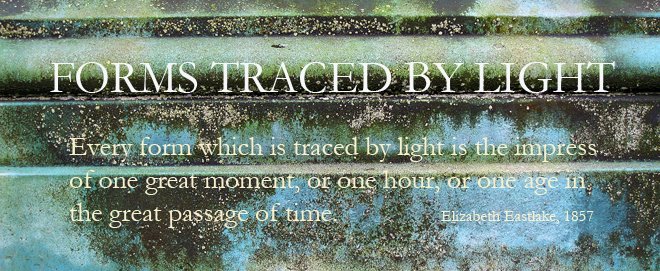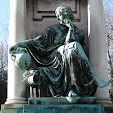But what else would I put on my mother's coffin (dark grey, made from the wool of Swaledale sheep) other than a posy of flowers from the garden? It's remarkable how much is in bloom at this time of the year. And (see the eulogy below) - those ribbons are in suffrage colors.
And, yes, that is a bowl of lemon slices. My father insisted on doing the slicing (in preparation for the post-funeral reception) since I "wouldn't know how to to it properly." I'll concede him the point (maybe): he was once a bar tender.
For those who wanted to see the eulogy I gave my mother - here it is. I thought I wouldn't get through the last paragraph, for obvious reasons, but somehow, I did.
-----------------------------------------------------------------------------------------------------------------------
Thank you all so much for being here today, and for helping to remember and celebrate Joy’s life.
I’m not entirely sure that Joy would have approved of a eulogy: I can hear her voice saying “hmph” at the thought. She was a very private person, a modest person – but someone who was, nevertheless, quietly proud of certain things. First, Joy was proud of her Yorkshire background. She was born in Hanging Heaton, Batley, in February 1923, in a house that looked over fields to the family shoddy mill. She took enormous pride in her maternal line: they were also in the recycled wool business, and before that, had been farmers in North Yorkshire; she was a great source of Yorkshire proverbs and of West Riding dialect - despite, or because of, having been forbidden to speak it as a child. Her grandmother was a JP, and helped establish, I’m sure, Joy’s liking for strong-minded women. In her early teens, Joy moved to Birmingham, won a scholarship to King Edward’s School, which she loved – and where she met her oldest friend, Gwen Rooke (later Pascal): life-long cross-channel visits and letters followed. When war broke out, she was evacuated to Cheltenham – most likely on the same train as Ray, it turned out, although they didn’t establish that until later!
Joy went up to St Anne’s College, Oxford, in October 1942 to read for a BA in English Language and Literature – but only, initially, for a year. Under the terms of the Registration for Employment Order, she had to undertake war work, and late in 1943, Joy joined the Wrens (the Women’s Royal Naval Service), where she first worked mending and servicing aircraft, and then as a Plotter, in Liverpool, where she traced the movement of shipping and, occasionally, aircraft. The WRNS provided her with a host of memorable anecdotes, from washing up Christmas dinner for a thousand shortly after joining up, to attending a rather boisterous party thrown by the Dutch navy: she relished the mix of people alongside whom she found herself working. When she was demobilized in April 1946, she re-joined St Anne’s immediately and went on to complete her B.A. Back in 1943, she’d met Ray at a hop in the Birmingham student union – he was reading Engineering on an accelerated degree – and they married in September 1947.
Joy and Ray moved from Oxford to Kew, then to Wimbledon, and then, in 1957, to Naworth Castle, near Brampton, in Cumberland: near where Ray was working, and a border castle tower just happened to be for rent at the time. My memories of Joy go back to pre-Naworth days, when she was a memorably imaginative mother: moving around close to the carpet to see what life looked like from a small person’s point of view; tracing her finger under a line of words when she read to me, so I picked up how to read without officially learning; entering into the world of my imaginary friend Mustapha. At Naworth, where we lived for four years before returning to Wimbledon; where she homeschooled me and, from time to time, a couple of other children, I absorbed so much that’s become important to me ever since – like details of history, together with the importance of its broad sweep – and how could history not be vivid when you live in a castle, with Hadrian’s Wall to walk down just a few miles away? She taught me the names of flowers and trees and birds; how to look at the natural and the built world with attention and curiousity – at Naworth, snowdrops and jasmine and catkins; the Dacre beasts and photographs of Tennyson in the walled garden; the Flodden sword and Burne Jones’s frieze of that border battle.
After a short period of graduate work, Joy started her long career as an examiner of O and A level English papers, eventually becoming Chief Examiner in English for the Oxford Delegacy of Local Examinations. Stacks of examination scripts, mark schemes and mark sheets – these were a constant feature of our summers. She loved the fact that meetings took her to Oxford, where, from the late 1970s, she much enjoyed her flat, with its wonderful views over the Dragon School playing fields to the Cherwell. For many years, in Wimbledon, she regularly prepared students for Oxford and Cambridge University Entrance examinations – she worked for the Ursuline Convent, and had a number of students whom she saw privately. Above all, she wanted – she expected – students to share her love of literature. She had clear, but eclectic favourites: John Keats and Robert Frost; Jane Austen and Elizabeth Bishop; John Donne and A. E. Housman - the condensed; the epigrammatic; the piercing. I wish she’d written more herself: she had a fine-tuned, precise ear for language, which shows itself so well in the introduction she wrote for the edition of Thomas Hood’s poems that she prepared for the Carcanet Press. A sharp ear for language, and for grammar: “so” isn’t an adjective, she’d have told me. The satiric, irreverent, jokey Thomas Hood might seem like a surprising topic – but Joy had a terrific sense of humour, especially when it came to the incongruous. To Ray’s mystification, I think, sometimes when we started laughing together we couldn’t stop.
What mattered to Joy went well beyond the material world. She had a strong, albeit quietly held, sense of fairness and justice. When she was a small child, a close male relative was given boxing lessons: she had boxing lessons, too (and could show you the correct stance). Something that rankled with her always was that in 1930 she was told she was too young to attend the parade in Hull for pilot Amy Johnson after she became the first woman to fly solo from England to Australia. This was the same year that women in the UK obtained the vote on the same terms as men: knowing the value of this achievement, she always held voting to be a kind of sacred duty. This sense of responsibility showed itself, above all, in her compassion and care for the underdog, and for those she considered to have had a rough deal in life: she had a great deal of time for such people, and their stories. She had, however, a Yorkshire directness to her, and, unflinchingly honest, she could never bring herself to be hypocritical, even to be polite – so you always knew where you stood. This integrity actually helped to make Joy a wonderful conversationalist, and listener. Conversations with visitors, as well as with me, could go on well into the fading light of long summer evenings, invariably accompanied by a gin and tonic – “just a little one.”
After her heart attack in 1997, Joy guarded her stores of energy very carefully – but she still found plenty to enjoy: reading, of course – from Penelope Fitzgerald to new detective fiction; travelling, with Ray, to different parts of England; executing exquisite needlepoint; spending time with (or under) her cats – Sam, Hal, Simba; watching snooker and Inspector Morse and the Antiques Road Show; and doing a huge amount of research into family history. She was understandably proud of her ability to finish The Times crossword on a regular basis. Joy took an enormous interest in people – she was always fascinated by what made them tick, as though they were particularly complex characters in novels. And she loved her garden, reciting the names of favorite roses as if they were dear friends: Madame de Pompadour, Madame Alfred Carrière, Sarah Bernhardt.
Every time I came home, even in the dead of winter, there was a little, freshly picked posy from the garden waiting for me in my room. I’ll miss those – I’ll miss her, dreadfully – but I’m proud to be standing here today, as her daughter, and giving thanks, with you all, for her life.



No comments:
Post a Comment